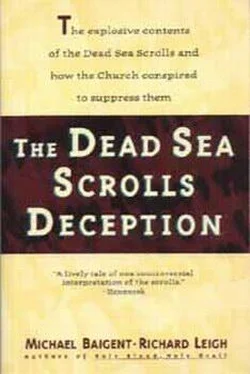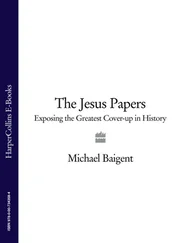Eisenman’s research has revealed the underlying simplicity of what had previously seemed a dauntingly complicated situation. As he says, ‘terms like: Ebionim, Nozrim, Hassidim, Zaddikim (i.e., Ebionites, Palestinian Christians, Essenes, and Zadokites), turn out to be variations on the same theme’ 1, while ‘the various phraseologies the community at Qumran used to refer to itself, e.g. ‘sons of light’… do not all designate different groups, but function as interchangeable metaphors’. 2
The militant Zealots and Sicarii will prove similarly to be variations on the same theme, manifestations of the same movement. This movement is militant, nationalistic, revolutionary, xenophobic and messianic in character. Although rooted in Old Testament times, it coalesces during the Maccabean period of the 2nd century BC; but the events of the 1st century of the Christian era will imbue it with a new and particularly ferocious momentum. At the core of the movement lies the question of dynastic legitimacy — legitimacy not just of the ruling house, but of the priesthood. In the beginning, indeed, priestly legitimacy is the more important.
The legitimacy of the priesthood had become crucial in Old Testament times. It was supposed to descend lineally from Aaron through the Tribe of Levi. Thus, throughout the Old Testament, the priesthood is the unique preserve of the Levites. The Levite high priests who attend David and Solomon are referred to as ‘Zadok’ — though it is not clear whether this is a personal name or an hereditary title. 3Solomon is anointed by Zadok, thereby becoming ‘the Anointed One’, the ‘Messiah’ — ‘ ha-mashi’ah’ in Hebrew. But the high priests were themselves also anointed and were also, in consequence, ‘Messiahs’. In Old Testament times, then, the people of Israel are, in effect, governed by two parallel lines of’Messiahs’, or ‘Anointed Ones’. One of these lines presides over spiritual affairs and descends from the Tribe of Levi through Aaron. The other, in the form of the kingship, presides over secular affairs and traces itself, through David, to the Tribe of Judah. This, of course, explains the references in the Dead Sea Scrolls to ‘the Messiah(s) of Aaron and of Israel’, or ‘of Aaron and of David’. The principle is essentially similar to that whereby, during the Middle Ages in Europe, Pope and Emperor were supposed to preside jointly over the Holy Roman Empire.
The priestly line invoking a lineage from Aaron maintained their status until the Babylonian invasion of 587 BC. In 538 BC, when the ‘Babylonian Captivity’ ended, the priesthood quickly re-established itself, again claiming a descent (metaphorical, if not literal) from Aaron. In 333 BC, however, Alexander the Great overran the Holy Land. For the next 160-odd years, Palestine was to be ruled by a succession of Hellenistic, or Greek-oriented, dynasties. The priesthood, during this period, spawned a bewildering multitude of claimants, many of whom adapted, partially or completely, to Hellenistic ways, Hellenistic life-styles, Hellenistic values and attitudes. As is often the case in such circumstances, the general liberalising tendency engendered a ‘hard-line’ conservative reaction. There arose a movement which deplored the relaxed, heterodox and ‘permissive’ atmosphere, the indifference to old traditions, the defilement and pollution of the ancient ‘purity’, the defiance of the sacred Law. This movement undertook to rid Palestine of Hellenised collaborators and libertines, who had, it was felt, by their very presence, desecrated the Temple.
According to the first book of Maccabees, the movement first asserted itself — probably around 167 BC — when Mattathias Maccabaeus, a country priest, was ordered by a Greek officer to sacrifice on a pagan altar, in defiance of Judaic law. Enraged by this blasphemous sight, Mattathias, who ‘burned with zeal for the Law’ (1 Mace. 2:26), summarily killed a fellow Jew who complied, along with the Greek officer. In effect, as Eisenman has said, Mattathias thus became the first ‘Zealot’. 4Immediately after his action in the Temple, he raised the cry of revolt: ‘Let everyone who is zealous for the Law and supports the Covenant come out with me’ (1 Mace. 2:27). Thereupon, he took to the countryside with his sons, Judas, Simon, Jonathan and two others, as well as with an entourage called the ‘Hasidaeans’ — ‘mighty warriors of Israel, every one who offered himself willingly for the Law’ (1 Mace. 2:42). And when Mattathias, a year or so later, lay on his deathbed, he exhorted his sons and followers to ‘show zeal for the Law and give your lives for the Covenant of our fathers’ (1 Mace. 2:50).
On Mattathias’s death, control of the movement passed to his son, Judas, who ‘withdrew into the wilderness, and lived like wild animals in the hills with his companions, eating nothing but wild plants to avoid contracting defilement’ (2 Mace. 5:27). This attests to what will eventually become an important principle and ritual — that of purifying oneself by withdrawing into the wilderness and, as a species of initiation, living for a time in seclusion. Here, Eisenman suggests, is the origin of remote communities such as Qumran, the first foundation of which dates from Maccabean times. 5It is, in effect, the equivalent of the modern ‘retreat’. In the New Testament, of course, the supreme exemplar of self-purification in remote solitude is John the Baptist, who ‘preached in the wilderness’ and ate ‘locusts and honey’. But it must be remembered that Jesus, too, undergoes a probationary initiatory experience in the desert.
From the fastnesses to which they had withdrawn, Judas Maccabaeus, his brothers and his companions embarked on a prolonged campaign of guerrilla operations which escalated into a full-scale revolt and mobilised the people as a whole. By 152 bc, the Maccabeans had wrested control of the Holy Land, pacified the country and installed themselves in power. Their first act, on capturing the Temple, was to ‘purify’ it by removing all pagan trappings. It is significant that though the Maccabeans were simultaneously de facto kings and priests, the latter office was more important to them. They hastened to regularise their status in the priesthood, as custodians of the Law. They did not bother to call themselves kings until the fourth generation of their dynasty, between 103 and 76 bc.
From the bastion of the priesthood, the Maccabeans promulgated the Law with fundamentalist ferocity. They were fond of invoking the Old Testament legend of the ‘Covenant of Phineas’, which appears in the Book of Numbers. 6Phineas was said to be a priest and a grandson of Aaron, active after the Hebrews had fled Egypt under Moses and established themselves in Palestine. Shortly thereafter, their numbers are devastated by plague. Phineas turns on one man in particular, who has taken a pagan foreigner to wife; seizing a spear, he promptly dispatches the married couple. God, at that point, declares that Phineas is the only man to ‘have the same zeal as I have’. And He makes a covenant with Phineas. Henceforth, in reward for his zeal for his God (1 Mace. 2:54), Phineas and his descendants will hold the priesthood for all time.
Such was the figure to whom the Maccabean priesthood looked as a ‘role model’. Like Phineas, they condemned all relations, of any kind, with pagans and foreigners. Like Phineas, they insisted on, and sought to embody, ‘zeal for the Law’. This ‘xenophobic antagonism’ to foreign ways, foreign wives etc. was to be passed on as a legacy, and ‘would seem to have been characteristic of the whole Zealot/Zadokite orientation’. 7
Whether the Maccabeans could claim a literal pedigree from Aaron and from David is not certain. Probably they couldn’t. But their ‘zeal for the Law’ served to legitimise them. During their dynasty, therefore, Israel could claim both a priesthood and a monarchy that conformed more or less to the stringent criteria of Old Testament authority.
Читать дальше












